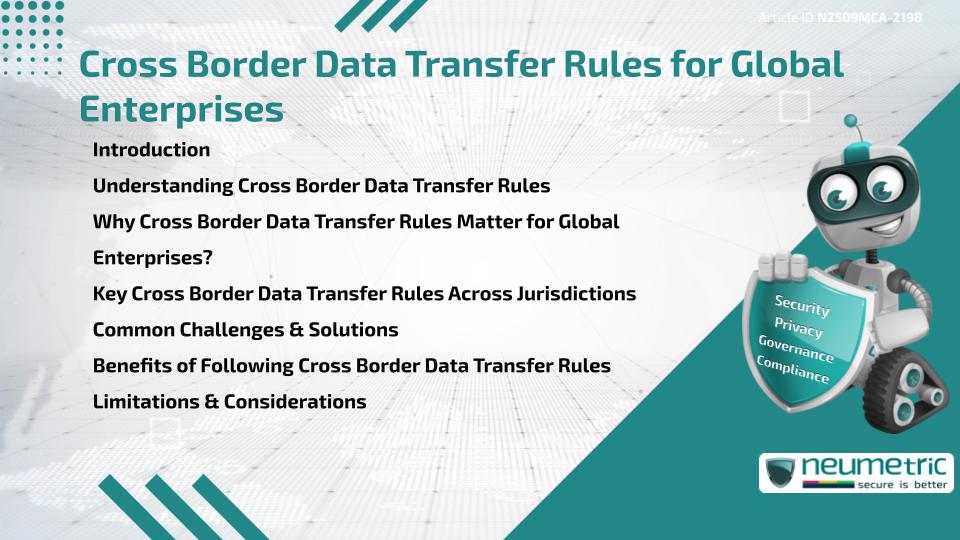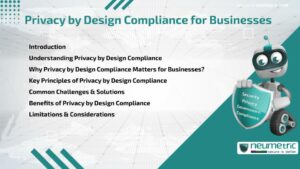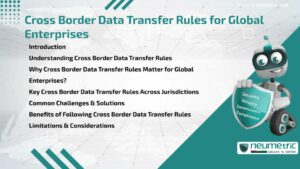Table of Contents
ToggleIntroduction
As businesses expand Internationally, managing Sensitive Information across jurisdictions has become increasingly complex. Cross border Data Transfer Rules regulate How Personal & Business Data can move between Countries, ensuring Privacy & Security Standards are upheld. For Global Enterprises, Compliance with these Rules is Critical for avoiding Penalties, maintaining Customer Trust & Ensuring smooth Operations.
Understanding Cross Border Data Transfer Rules
Cross border Data Transfer Rules are Legal Frameworks that define How Personal Data may be Transferred outside a Country or Region. These Rules are designed to protect individuals’ Privacy when their Data leaves the jurisdiction of origin. Compliance involves ensuring equivalent protections in the receiving country or applying Safeguards such as Contractual Clauses.
For background, see the OECD Privacy guidelines.
Why Cross Border Data Transfer Rules Matter for Global Enterprises?
Global Enterprises process large Volumes of Customer, Employee & Partner Data. Mismanaging Transfers can lead to Non-compliance with Laws like GDPR, resulting in heavy Fines. These Rules matter because they:
- Protect sensitive Personal Data from Misuse.
- Ensure Compliance with International Data Protection Laws.
- Build trust with Customers, Regulators & Stakeholders.
- Facilitate smoother Global Operations by reducing Legal uncertainty.
The European Data Protection Board highlights the significance of lawful Cross-border Transfers under GDPR.
Key Cross Border Data Transfer Rules Across Jurisdictions
- European Union [GDPR] – Data can only be Transferred to Countries with adequate protections or through Mechanisms such as Standard Contractual Clauses [SCCs].
- United States – No single law, but Frameworks like the EU-US Data Privacy Framework govern Transatlantic Transfers.
- India [DPDPA 2023] – Transfers require Compliance with Data Protection authority requirements & Government-approved Safeguards.
- Asia-Pacific [APEC CBPR] – Provides a voluntary, Standards-based Framework for member economies.
- Brazil [LGPD] – Similar to GDPR, requiring adequate safeguards for International Data flows.
For comparative insights, see the ENISA Data Protection resources.
Common Challenges & Solutions
- Regulatory Complexity – Use Data mapping to understand Where & How Data is Transferred.
- Legal Uncertainty – Apply Contractual Safeguards like SCCs or Binding Corporate Rules [BCRs].
- Vendor Oversight – Ensure Third Party Service Providers comply with applicable Rules.
- Data Security Risks – Use Encryption & Secure Transmission Protocols.
The NCSC UK Data Protection guidance offers additional Best Practices.
Benefits of Following Cross Border Data Transfer Rules
- Regulatory Assurance – Demonstrates Compliance with International Laws.
- Stronger Data Protection – Reduces Risks of Unauthorised Access or Misuse.
- Operational Continuity – Enables smoother global Collaboration & Transactions.
- Reputation Enhancement – Builds trust among Customers & Regulators.
Limitations & Considerations
Cross border Data Transfer Rules vary across jurisdictions & are frequently updated. Compliance Frameworks provide guidance but require Continuous Monitoring & Adaptation. Enterprises must balance Operational efficiency with Legal & Security Obligations.
Takeaways
- Cross Border Data Transfer Rules define how Personal Data can move between jurisdictions.
- They vary globally, with GDPR, LGPD, DPDPA & APEC CBPR setting key Standards.
- Compliance strengthens Security, reduces Risks & builds Stakeholder trust.
FAQ
What are Cross Border Data Transfer Rules?
They are Legal requirements governing the movement of Personal Data between jurisdictions.
Why do they matter for Enterprises?
They protect Privacy, ensure Compliance & Support International Operations.
What laws govern these Transfers?
GDPR, LGPD, DPDPA 2023, APEC CBPR & Regional Frameworks.
How can Enterprises comply?
Through Contractual Safeguards, Vendor Oversight, Encryption & Audits.
Do Rules change frequently?
Yes, Global Data Protection regulations evolve & must be monitored regularly.
References
- OECD – Privacy Guidelines
- European Data Protection Board
- ENISA – Data Protection Resources
- NCSC UK – Data Protection Guidance
- IT Governance – Data Transfer Compliance
Need help for Security, Privacy, Governance & VAPT?
Neumetric provides organisations the necessary help to achieve their Cybersecurity, Compliance, Governance, Privacy, Certifications & Pentesting needs.
Organisations & Businesses, specifically those which provide SaaS & AI Solutions in the Fintech, BFSI & other regulated sectors, usually need a Cybersecurity Partner for meeting & maintaining the ongoing Security & Privacy needs & requirements of their Enterprise Clients & Privacy conscious Customers.
SOC 2, ISO 27001, ISO 42001, NIST, HIPAA, HECVAT, EU GDPR are some of the Frameworks that are served by Fusion – a SaaS, multimodular, multitenant, centralised, automated, Cybersecurity & Compliance Management system.
Neumetric also provides Expert Services for technical security which covers VAPT for Web Applications, APIs, iOS & Android Mobile Apps, Security Testing for AWS & other Cloud Environments & Cloud Infrastructure & other similar scopes.
Reach out to us by Email or filling out the Contact Form…





